Perhaps. Vitamin D is important for maintenance of healthy skin and might have a role in the treatment of acne.

The Essential Info
Vitamin D is crucial to skin health in general, and there is some evidence trickling in that suggests it might play a role in treating acne.
First, researchers have published several studies that show us that people with acne may have lower vitamin D levels than those without acne.
And, we also now have two studies showing that supplementation with vitamin D reduces acne symptoms.
Vitamin D serves several functions in the skin, including:
- Killing harmful bacteria: Acne is in part a bacterial disease
- Reducing inflammation: Acne is a chronic inflammatory disease
- Helping to heal wounds: Acne lesions are, medically speaking, small wounds
- Contributing to the development of new, healthy cells: Unhealthy cells lead to clogged pores
Ensuring Your Levels are Adequate: We get vitamin D primarily through sun exposure. If you are light-skinned, approximately 20 minutes of unprotected exposure per day will ensure you get the vitamin D you need. Darker skin requires more, with people who have the darkest skin requiring upwards of 2 hours per day. If you are not getting regular sun exposure, ask your doctor for a simple vitamin D blood test, and if your levels are low, widely-available oral vitamin D supplements can bump you back up to healthy levels.
Caution: Vitamin D is a fat-soluble vitamin. This means it can build up in your body to toxic levels. Do not take too much! Safe supplementation levels are 800-1000 IU per day.

The Science
- Vitamin D in Acne Development and Treatment
- Of Particular Concern: Patients Treated with Isotretinoin (Accutane®)
- How to Check Your Vitamin D Level
Even though we don’t know yet exactly how vitamin D impacts acne, we do know that it is vitally important to the health of the skin.1,2
Our bodies produce vitamin D when the skin is exposed to sunlight. After it is produced in the skin, it then goes on to bind to all other skin cells as well as all of the body’s immune cells.
Vitamin D has various beneficial effects, depending on which type of cell it binds to, many of which are potentially directly related to acne, including:
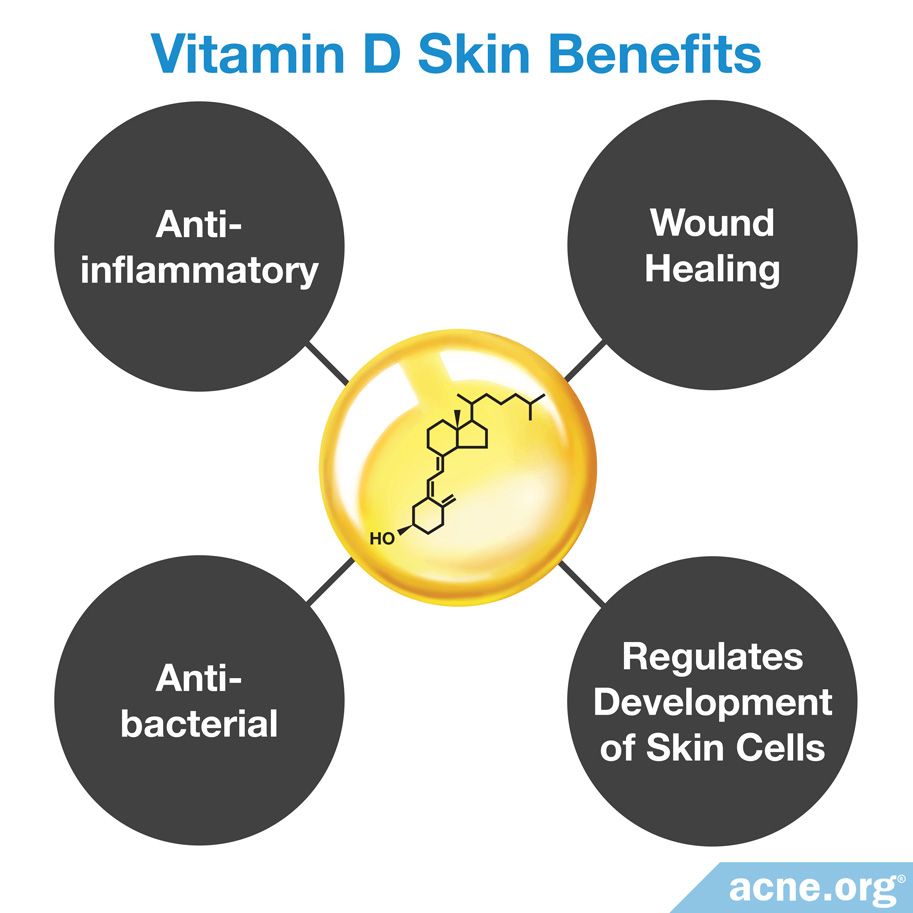
- Killing harmful bacteria that contribute to acne: Acne is in part a bacterial disease, and killing bacteria can reduce the redness, pain, and swelling in acne lesions.
- Decreasing inflammatory responses in certain immune cells and in skin oil cells: Acne is at its core an inflammatory disease, so less inflammatory responses could mean less acne.
- Helping the immune system heal wounds: Medically speaking, acne lesions are small wounds.
- Regulating the growth and development of various types of skin cells, including skin oil cells: Acne develops in part because of an overgrowth of skin cells that clog pores, as well as overproduction of skin oil from overly active skin oil cells. Regulating these cells could calm acne symptoms.
Let’s have a look at each of these effects now one by one and see how an argument can be made that vitamin D may be important when it comes to acne.
Antibacterial Effects
Vitamin D has antibacterial effects, which suggests that it might have potential for treating acne.
It acts on bacteria directly, by slowing down bacterial growth or killing the bacteria entirely, and indirectly, by helping the immune system produce molecules called antimicrobial peptides that kill bacteria. As noted in a 2011 article in Dermato-Endocrinology, “In the presence of…[vitamin D], [various types of bacteria] were killed or demonstrated marked growth inhibition.”3
The same 2011 article in Dermato-Endocrinology noted that “[v]itamin D and its analogues via these [antimicrobial] mechanisms are playing an increasing role in the management of atopic dermatitis, psoriasis, vitiligo, acne and rosacea.”3
Even though this article didn’t look directly at the effects of vitamin D on acne bacteria (C. acnes), the fact that vitamin D has antimicrobial effects on a variety of different bacteria, and on other skin diseases, points to the possibility that it might have similar effects on C. acnes, which could lead to less severe acne.
Anti-Inflammatory Effects
As scientists have researched acne over the decades, it has become clear that at its root, acne is an inflammatory disease.
Vitamin D has anti-inflammatory properties, which have already been proven to help treat inflammatory skin conditions, such as psoriasis and atopic dermatitis. The fact that vitamin D is beneficial in other inflammatory skin conditions suggests that it might be helpful in treating acne as well.
How does it lessen inflammation? When vitamin D binds to immune cells, it helps to calm the immune system by decreasing the production of molecules within immune cells that cause skin inflammation, called macrophages. It does the same thing when it binds to skin oil cells.1,4,5
Wound Healing
Wound healing is an important component of acne treatment because the process of healing acne lesions is similar to healing other types of wounds.
Vitamin D plays an important role in the wound healing process by helping drive the development of wound-repairing cells. It was found that without vitamin D, the process of developing new cells to replace damaged cells slows down, and thus wound healing is impaired.6,7 Additionally, scientists have found that the antimicrobial peptides that vitamin D causes immune cells to produce can further help with wound repair.3 Finally, vitamin D may be crucial to the formation of the skin’s barrier. In other words, it may help bring the skin back to normal after trauma.8
Since vitamin D plays a crucial role in healing wounds, it is reasonable to infer that vitamin D might help to heal acne lesions in the same way that it helps to heal other types of wounds.
Vitamin D in Acne Development and Treatment
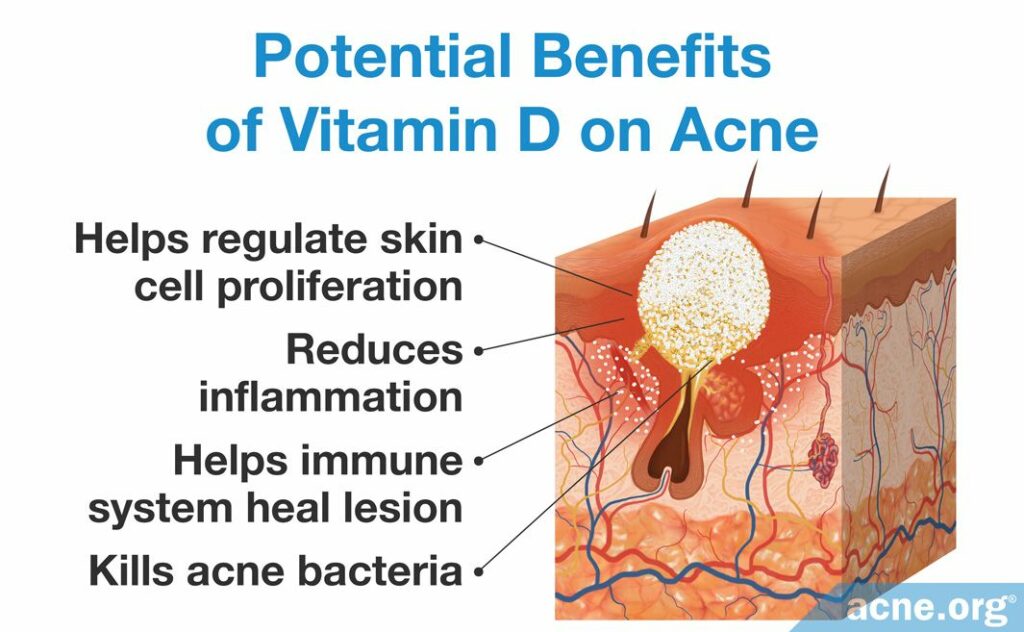
Research evidence is mounting that people with acne, especially those with severe acne, tend to have lower levels of vitamin D compared to people without acne.9-11,14 Two small studies also found that oral vitamin D supplements might improve acne in people with a vitamin D deficiency.10,13 Large clinical studies are needed to validate these results, but it looks like vitamin D has something to offer when it comes to acne treatment.15
Expand to read details of studies
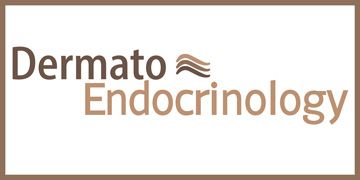
The first study, published in Dermato-Endocrinology in 2014, compared blood levels of vitamin D in people with severe acne and in people without acne. The researchers wrote, “The patients with [severe] acne had relatively low [blood] vitamin D levels compared with the subjects in the control group. The findings from this study suggest that there is a connection between low vitamin D levels and acne.”9

The second study, published in the journal PLoS One in 2016, compared vitamin D levels in 80 people with acne and 80 people without acne. The researchers found that 48.8%, or almost half, of the people with acne were deficient in vitamin D, compared to only 22.5%, or about a quarter, of people without acne. The scientists also found that the people with the lowest levels of vitamin D tended to have the most severe acne.
In the second part of this study, the researchers tested whether vitamin D supplements could help improve acne. The 39 people with acne who were vitamin D-deficient participated in this part of the study. The scientists randomly split these people into two groups:
1. Group 1 consisted of 20 people who received an oral vitamin D supplement every day for two months
2. Group 2 consisted of 19 people who received a placebo (a similar-looking supplement lacking vitamin D) every day for two months
After 2 months, the researchers examined the people in both groups for acne improvements. They found that the number of inflammatory acne lesions decreased in Group 1 more than in Group 2. This suggests that correcting a vitamin D deficiency might improve acne.10

The third study, published in the Journal of Cosmetic Dermatology in 2019, also looked at vitamin D levels in 90 people with acne. The researchers found that the people with the lowest vitamin D levels tended to have the worst acne. However, the scientists could not determine whether it was the low vitamin D levels that made acne worse, or whether having severe acne somehow lowered vitamin D levels.11

Another study, published in 2009 in The Journal of Steroid Biochemistry and Molecular Biology, found that vitamin D could potentially help in acne treatment by targeting skin oil glands, and the authors mentioned that vitamin D compounds “represent promising compounds for the treatment of…acne.”12

In a 2019 study published in the Journal of Dermatological Treatment, researchers randomly split 100 patients with acne into 2 groups:
- Group 1 received 0.25 µg of the active form of vitamin D, called alfacalcidol, once a day.
- Group 2 received a placebo instead.
The experimented lasted 3 months. After that time period, the researchers found that the level of vitamin D had increased significantly in Group 1, but not in Group 2. Moreover, acne patients in Group 1 showed lower levels of substances related to inflammation in their blood compared to patients receiving a placebo. Finally, acne itself became less severe in Group 1, but not in Group 2 by the end of the experiment. These findings suggest that vitamin D supplements may have helped patients in Group 1 with their acne by reducing inflammation.13
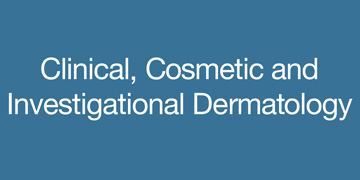
A 2020 study published in the journal Clinical, Cosmetic and Investigational Dermatology measured vitamin D levels in 68 patients with acne and 50 people without acne. Similar to earlier studies, the researchers reported that people without acne had significantly higher levels of vitamin D in their blood than patients with acne.14
Of Particular Concern: Patients Treated with Isotretinoin (Accutane®)
Isotretinoin, often referred to by its original brand name, Accutane®, is a common treatment for severe acne.
In a 2011 study in Dermatologic Therapy, researchers investigated the effect of isotretinoin treatment on vitamin D levels. This study, which looked at 50 acne patients who were treated with isotretinoin for three months, found that “vitamin D…levels decreased significantly.”16 This result suggests that people taking isotretinoin might be wise to take a vitamin D supplement in order to prevent vitamin D deficiency.
How to Check Your Vitamin D Level
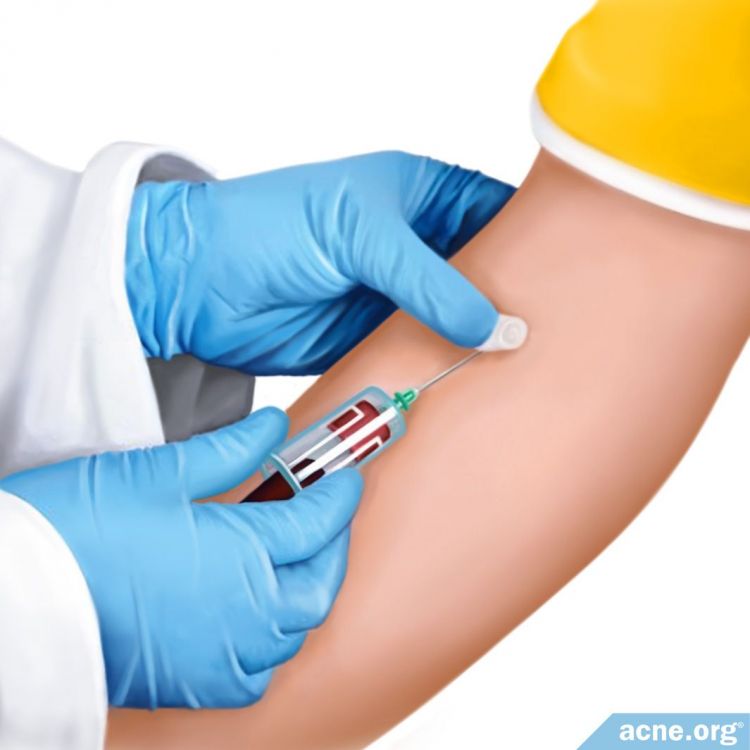
You can ask your doctor for a routine and simple blood test to determine if you have adequate vitamin D levels. This is especially important if you are at risk for vitamin D deficiency due to lack of sun exposure or other disorders that interfere with vitamin D absorption. If your vitamin D levels are low, taking an oral supplement might be a good idea. Check with your doctor to determine an appropriate dosage for you, but 800 – 1000 IU (international units) per day of vitamin D is a common guideline.
References
- Reichrath, J. Vitamin D and the skin: an ancient friend, revisited. Exp Dermatol 16, 618 – 625 (2007). https://www.ncbi.nlm.nih.gov/pubmed/17576242
- Norval, M. The mechanisms and consequences of ultraviolet-induced immunosuppression. Prog Biophys Mol Biol 92, 108 – 118 (2006). https://www.ncbi.nlm.nih.gov/pubmed/16564073
- Youssef, D. A. et al. Antimicrobial implications of vitamin D. Dermatoendocrinol 3, 220 – 229 (2011). https://www.ncbi.nlm.nih.gov/pmc/articles/PMC3256336/
- Lee, W. J., Choi, Y. H., Sohn, M. Y., Lee, S. J. & Kim, D. W. Expression of Inflammatory Biomarkers from Cultured Sebocytes was Influenced by Treatment with Vitamin D. Indian J Dermatol 58, 327 (2013). https://www.ncbi.nlm.nih.gov/pubmed/23919024
- Agak, G. W. et al. Propionibacterium acnes Induces an IL-17 Response in Acne Vulgaris that Is Regulated by Vitamin A and Vitamin D. J Invest Dermatol 134, 366 – 373 (2014). https://www.ncbi.nlm.nih.gov/pubmed/23924903
- Oda, Y., Tu, C. L., Menendez, A., Nguyen, T. & Bikle, D. D. Vitamin D and calcium regulation of epidermal wound healing. J Steroid Biochem Mol Biol 164, 379 – 385 (2016). https://www.ncbi.nlm.nih.gov/pubmed/26282157
- Xie, Z. et al. Lack of the vitamin D receptor is associated with reduced epidermal differentiation and hair follicle growth. J Invest Dermatol 118, 11 – 16 (2002). https://www.ncbi.nlm.nih.gov/pubmed/11851870
- Oda, Y. et al. Vitamin D receptor and coactivators SRC2 and 3 regulate epidermis-specific sphingolipid production and permeability barrier formation. J Invest Dermatol 129, 1367 – 1378 (2009). https://www.ncbi.nlm.nih.gov/pmc/articles/PMC2843519/
- Yildizgoren, M. T. & Togral, A. K. Preliminary evidence for vitamin D deficiency in nodulocystic acne. Dermatoendocrinol 6, e983687 (2014). https://www.ncbi.nlm.nih.gov/pubmed/26413187
- Lim, S.K., Ha, J.M., Lee, Y.H., Lee, Y., Seo, Y.J., Kim, C.D., Lee, J.H. & Im, M. Comparison of vitamin D levels in patients with and without acne: A case-control study combined with a randomized controlled trial. PLoS One 11, e0161162 (2016). https://www.ncbi.nlm.nih.gov/pubmed/27560161
- El-Hamd, M.A., El Taieb, M.A., Ibrahim, H.M. & Aly, S.S. Vitamin D levels in acne vulgaris patients treated with oral isotretinoin. J Cosmet Dermatol 18, 16-20 (2019). https://www.ncbi.nlm.nih.gov/pubmed/29460332
- Kramer, C. et al. Characterization of the vitamin D endocrine system in human sebocytes in vitro. J Steroid Biochem Mol Biol 113, 9 – 16 (2009). https://www.ncbi.nlm.nih.gov/pubmed/19027855
- Ahmed Mohamed, A. et al. The impact of active vitamin D administration on the clinical outcomes of acne vulgaris. The Journal of Dermatological Treatment 32, 756-761 (2021). https://pubmed.ncbi.nlm.nih.gov/31868550/
- Alhetheli, G. et al. Vitamin D levels in patients with and without acne and its relation to acne severity: A case-control study. Clinical, Cosmetic and Investigational Dermatology 13, 759-765 (2020). https://pubmed.ncbi.nlm.nih.gov/33116739/
- Wang, M. et al. Vitamin D status and efficacy of vitamin D supplementation in acne patients: A systematic review and meta-analysis. Journal of Cosmetic Dermatology 20, 3802-3807 (2021). https://pubmed.ncbi.nlm.nih.gov/33690970/
- Ertugrul, D. T., Karadag, A. S., Tutal, E. & Akin, K. O. Therapeutic hotline. Does isotretinoin have effect on vitamin D physiology and bone metabolism in acne patients? Dermatol Ther 24, 291 – 295 (2011). https://www.ncbi.nlm.nih.gov/pubmed/21410620
The post Does Vitamin D Help Treat Acne? appeared first on Acne.org.
